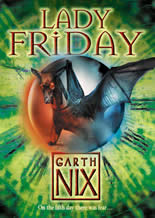[button color=”black” size=”big” link=”http://affiliates.abebooks.com/c/99844/77798/2029?u=http%3A%2F%2Fwww.abebooks.com%2Fservlet%2FSearchResults%3Fisbn%3D9780062237330″ target=”blank” ]Purchase here[/button]
The title of the ninth Discworld novel by Terry Pratchett is Faust, crossed out, with Eric written over it instead. Obviously this is a spoof of Faust with partial credit given to another author named Josh Kirby. It’s a short novel, compared to the other Discworld stories, maybe more of a novella or novellette.
Anyway, Eric is a 13-year-old demonologist who decides to conjure up a demon, so he can get three wishes: to be the ruler of the world, to meet the most beautiful woman who ever lived, and to live forever.
Meanwhile, the current Devil has taken a page from humanity’s Book of Tortures and turned Hell into a bureaucratic nightmare. He is watching Eric on with interest, hoping to make something truly fiendish out of this young soul. However, Eric blunderingly summons Rincewind the wizard from the nether realms, where he was trapped at the end of Sourcery, along with the Luggage, which is so fiercely loyal that it literally follows him to hell and back.
So Rincewind and Eric go on a magical (?) journey together. The bumbling, cowardly wizard, who the boy is still convinced is a demon, somehow grants one wish after another and they all turn out wrong. At last they find themselves at the gates of Hades, where all you-know-what breaks loose.
Pratchett’s twisted views of humanity are never more entertainingly displayed than here, though this is a very concentrated Discworld tale. One of his chief views, often touched upon, becomes a main theme in this story: that the greatest evils are not done by slavering monsters, demons, or deliberately evil people, but by well-intentioned, self-righteous people who think they are doing a “service to humanity.” It’s worth thinking about.
Recommended Age: 14+


